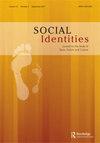More than ‘creative’: analyzing place branding strategies and Chinese migration in the City of Prato, Italy
IF 0.7
Q3 ETHNIC STUDIES
引用次数: 0
Abstract
ABSTRACT In a progressively urbanized world, the modes of governamentality adopted by city administrations increasingly focus on the adoption of strategic functions. Environmental safeguard, circular economy, and urban innovation, for instance, have been referred to, in the case of the Italian city of Prato, as the city’s orientation ‘towards the future’. Some of the ambitious projects that have characterized the recently adopted governance model of Prato relate in fact to urban forestation, connectivity, the realization of more public space and the application of ‘creativity’ as a driving force for urban development. Significantly, too, representations of Prato (as of today one of the most studied examples of migration from China to Europe) have been tied to images of a conflictual multiculturalism and to the liminal spaces of social relations within which Chineseness has often been relegated. In this article, I use secondary data and first-handedly retrieved information through qualitative methods to describe how the recent place branding project promoted by the municipality based on the concept of ‘creativity’ has particularly targeted a neighborhood named Macrolotto Zero, marked by decades of migration from China. In doing so, I discuss how the formulation and application of the place brand have generated frictions between stakeholders, as well as new transcultural alliances. These speak to the challenges of achieving a condition of living with difference in the city and provide a still-underexplored platform from which city-making processes and social identities can be analyzed.不仅仅是“创意”:分析意大利普拉托市的地方品牌战略和中国移民
摘要在一个日益城市化的世界里,城市管理部门采用的治理模式越来越注重战略职能的采用。例如,环境保护、循环经济和城市创新被称为意大利普拉托市“面向未来”的城市定位。最近采用的Prato治理模式中的一些雄心勃勃的项目实际上涉及城市绿化、连通性、实现更多公共空间以及将“创造力”作为城市发展的驱动力。同样值得注意的是,普拉托(迄今为止,普拉托是从中国移民到欧洲的最受研究的例子之一)的表现与冲突的多元文化主义的形象以及社会关系的边缘空间有关,在这些空间中,中国人往往被降级。在这篇文章中,我使用二次数据和第一手通过定性方法检索的信息来描述市政当局最近基于“创意”概念推动的地方品牌项目如何特别针对一个名为Macrolotto Zero的社区,该社区以数十年的中国移民为标志。在这样做的过程中,我讨论了地方品牌的制定和应用如何在利益相关者之间产生摩擦,以及新的跨文化联盟。这些都说明了在城市中实现差异化生活条件的挑战,并提供了一个尚未开发的平台,可以从中分析城市的形成过程和社会身份。
本文章由计算机程序翻译,如有差异,请以英文原文为准。
求助全文
约1分钟内获得全文
求助全文
来源期刊

Social Identities
ETHNIC STUDIES-
CiteScore
2.00
自引率
0.00%
发文量
22
期刊介绍:
Recent years have witnessed considerable worldwide changes concerning social identities such as race, nation and ethnicity, as well as the emergence of new forms of racism and nationalism as discriminatory exclusions. Social Identities aims to furnish an interdisciplinary and international focal point for theorizing issues at the interface of social identities. The journal is especially concerned to address these issues in the context of the transforming political economies and cultures of postmodern and postcolonial conditions. Social Identities is intended as a forum for contesting ideas and debates concerning the formations of, and transformations in, socially significant identities, their attendant forms of material exclusion and power.
 求助内容:
求助内容: 应助结果提醒方式:
应助结果提醒方式:


